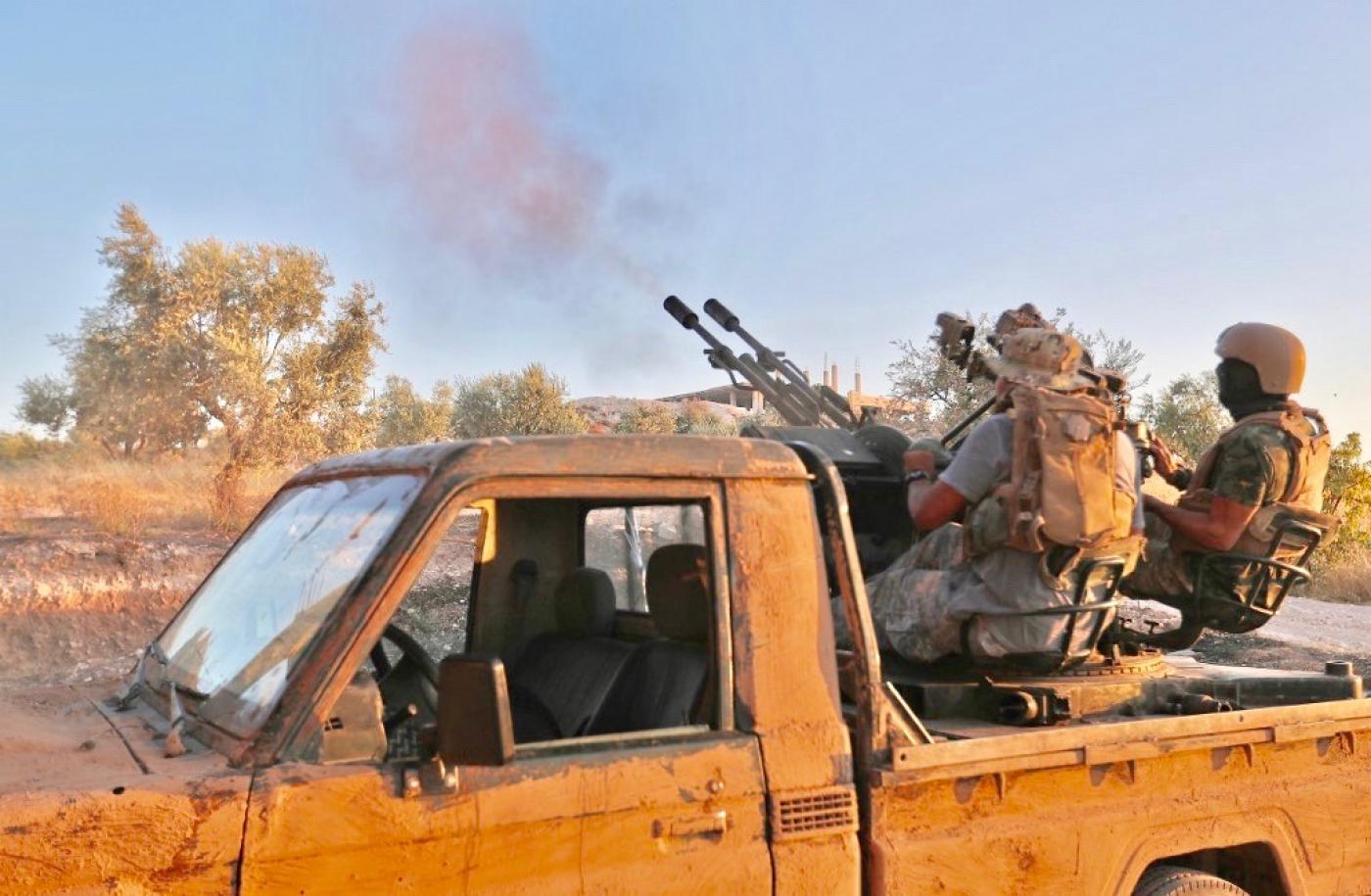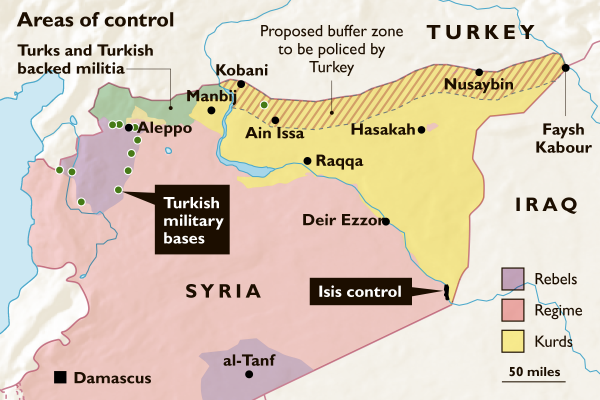
Militants from Hayat Tahrir al-Sham fire anti-aircraft gun mounted on pickup truck in Syria’s Idlib province last week
The three-year old Russian-Turkish tango in Syria has been incisive, exciting and provocative, but the inability of the two partners to trust each other or surrender to the care and needs of the other has deprived the relationship of the energies to work symbiotically.
If tango serves as a metaphor of relationship, an overall imbalance of energy on both sides is apparent in the Russian-Turkish moves on the Syrian turf.
There was always the suspicion that the endgame being played out in Idlib province in northwest Syria on the Turkish border would ultimately put to test the mettle of the Russian-Turkish axis in Syria. That is happening.
The major Russian-backed offensive by the Syrian government forces last week to recover the strategic town of Khan Sheikhoun that has been in rebel hands since 2014 and is the opposition’s last major stronghold has prompted Turkey to come to the aid of the rebel forces supported by it.
A Turkish military convoy sent to keep open supply routes for the opposition fighters was halted by an air attack on Monday by Syrian and Russian war planes. According to Iranian reports, the Turkish convoy comprised 28 military vehicles, including tanks and trucks carrying weapons and military equipment destined for Tahrir al-Sham al-Hay’at (read the Al-Nusra Front affiliated with al-Qaeda) terrorists holed up in Khan Sheikhoun.
A war of words has erupted. The Defence Ministry in Ankara squarely blamed Russia in a statement on Monday. Foreign Minister Mevlut Cavusoglu warned today at a press conference in Ankara that Damascus is “playing with fire.”
Turkey argues that the convoy was only ferrying supplies for its military observation post in Idlib, which was established in terms of an agreement with Russia last September.
The crux of the matter is that the September agreement obliged Turkey to neutralise the extremist groups ensconced in Idlib but in reality the terrorists since expanded their presence in the province and began attacking the Russian base nearby and the Syrian forces in the vicinity.
Russia put up with Turkey’s doublespeak for a year but patience has run out, especially as its Hmeymim air base is facing constant threat from terrorist attacks.
As for Damascus, capturing Khan Sheikhoun is an important gain in military terms not only for President Assad’s bid to recover “every inch” of Syria, but also since a highway running through that town connects Aleppo city.
Moscow has snubbed the Turks. While on a visit to France on Monday, President Putin said at a press conference that Russia supports the Syrian government forces’ on-going campaign against terrorists in Idlib.
Putin repeated that before the establishment of a demilitarised zone in Idlib by Turkey, the terrorists had controlled fifty percent of the province’s territory, but now 90% of Idlib’s territory is under the terrorist groups’ control.
Turkey has overreached in Syria. But then, there is more to it. To be sure, Turkey is paying a high price for its wrong policies. It should never have got involved with the US-led project to overthrow the regime in Syria; its dalliance with terrorist groups was (and continues to be) incomprehensible; its projection of power into Syria is violative of international law; and worst of all, it is still unwilling to reconcile with the established government in Damascus although it is clear that the Assad regime will remain in power for a foreseeable future.
Meanwhile, the deterioration of relations with the US is hitting Turkey hard. Washington is not in a mood to accommodate Turkey’s concerns and vital interests vis-a-vis the Kurdish issue.
Things have come to a point where, paradoxically, a US-Russia tacit understanding seems to exist in regard of northeast Syria.

There is a growing perception that the US and Russia are acting on an overall consensus in Syria, with Moscow having the say largely over the area on the western part of the Euphrates River, while the eastern side of the river where the Kurdish forces are present remains under US control. That is to say, the US retains its presence to the east of Euphrates, while the territories to the west of Euphrates come under Russian ‘sphere of influence.’
Conceivably, there could be a Russian-American congruence to keep Turkey out of northeastern Syria. The Iranian media reported on Monday that for the first time, Russian infantry units are being deployed in Bukamal region in Eastern Deir Ezzur province near the Iraqi border where Russia plans “to build military centres”.
On the other hand, Turkey’s partnership with Russia has become increasingly one-sided. Turkey cannot afford to antagonise Russia anymore, whereas, Russia no longer has to wear kid gloves while dealing with Ankara, although Turkey still is a NATO power.
In November 2015, when Turkey shot down a Russian Sukhoi Su-24M attack aircraft, Moscow was ultra-sensitive while reacting. But there is no apology for Monday’s air attack on the Turkish military convoy in Idlib.
The Russian Foreign Minister Sergey Lavrov asserted today that any attacks carried out by Islamist militant groups (which Turkey harbours) in the de-escalation zone in Idlib will be “forcefully suppressed”.
All in all, Russia has concluded that this is an opportune moment to clean up Idlib. Turkey’s proposal to establish a safe zone in northern Syria isn’t getting anywhere. The Turkish demand — a 30 to 40 kilometre deep safe zone stretching 430 kilometres all along the border upto Iraq — is not going to be acceptable to the US. But the US keeps Turkey engaged in talks to buy time while the US-backed Kurdish militia will retain their control of northeast Syria bordering Turkey.
In essence, Turkey risks a quagmire with two fronts — Idlib, where the Syrian offensive backed by Russia will trigger a massive refugee flow into Turkey, and a border with Syria that is dominated by well-armed, battle-hardened Kurdish groups.
